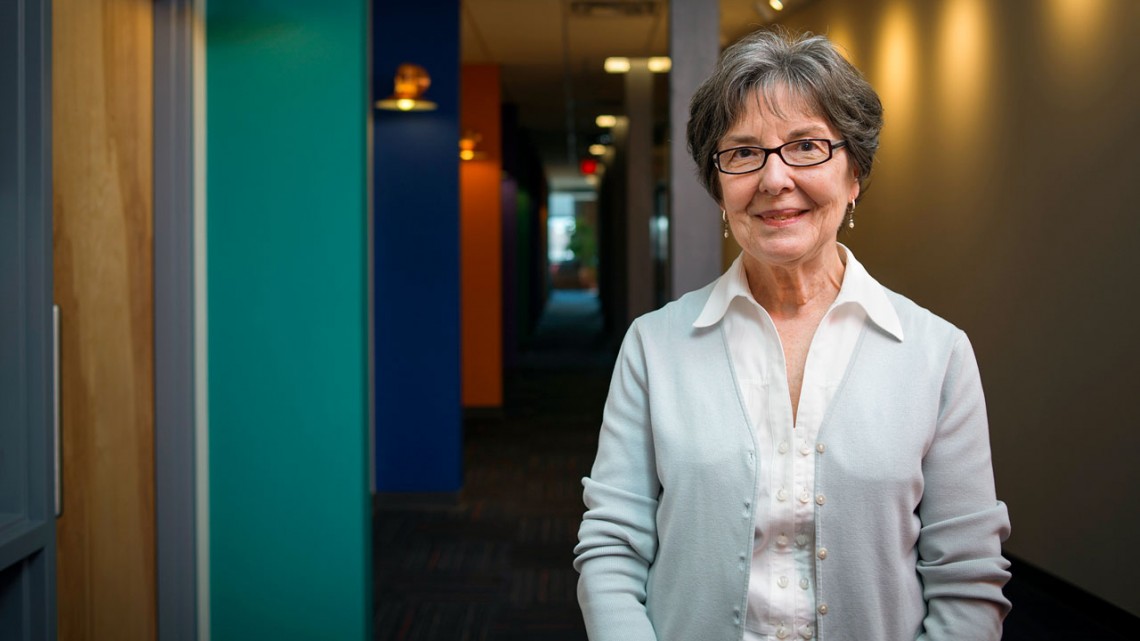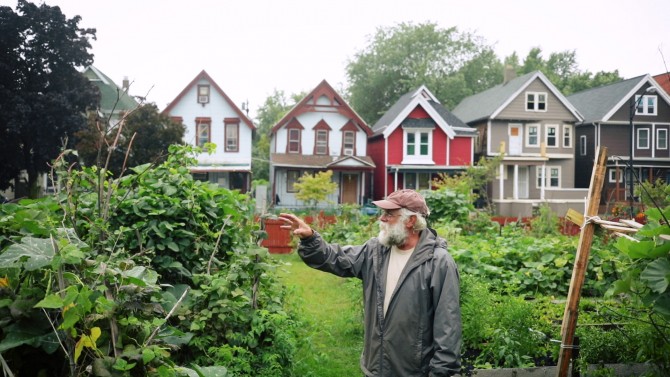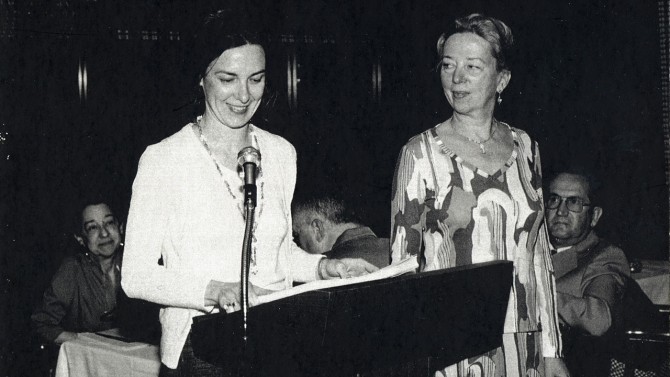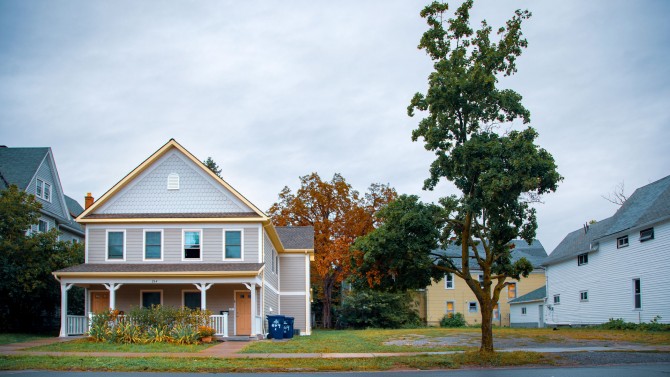
For more than four decades, Lou Jean Fleron has been making western New York a better place for working people, by leading the ILR’s School community-based economic development programs in Buffalo.
Creating equitable opportunity in Buffalo and beyond
By Julie Greco
Born in Hutchinson, Kansas, Lou Jean Fleron was raised on the Great Plains by working-class parents; her mother was a schoolteacher, her father worked in the oilfields. She attributes her commitment to equality to her upbringing – a commitment she’s used for 44 years to make Western New York a better place for working people.
“I’m a Midwestern pragmatist,” says Fleron, who has led the ILR School’s programs in Buffalo, New York, since 1976. “I believe you have to listen to everybody, and you have to work with people where they are, and you have to try to understand diverse interests and come to a common good. That is something that I think ILR, as an institution, is uniquely positioned to do.”
As director of the ILR School’s presence in western New York, Fleron has led initiatives such as The High Road Fellowship program, through which Cornell undergraduates work on community-based economic development in Buffalo; and the Partnership for the Public Good, a community-based think tank that seeks to build a more just, sustainable and culturally vibrant Buffalo and Niagara region.
“I am always drawn to a substantive focus on education, research and direct action around economic development,” Fleron says. “When I think of it from a career perspective, ILR has given me, and will continue to give me, extraordinary colleagues and enormous opportunities to change what I do so I can best make a difference.”
Fleron announced her retirement as director in fall 2020. But she’ll continue to lead the ILR Buffalo Co-Lab’s economic development initiatives.
“The breadth and depth of our ILR impact in Buffalo would not be possible without Lou Jean Fleron’s tireless dedication, commitment and vision over the past four decades,” says Ariel Avgar, ILR associate dean for outreach. “I am grateful to Lou Jean for her leadership and passion for our land-grant mission, but I am also grateful to have her continue to contribute in her new role to the Buffalo Co-Lab and to ILR.”
Fleron credits her extended family – her husband, three children, 10 grandchildren and 13 great-grandchildren – in connecting her to the work she has done in upstate New York.
“My family – the ones before and the ones after me – are central to the way I think about what is important in life and our responsibility to care for everybody, not just ourselves,” Fleron says. “I am a link from my ancestors, like those who were anti-slavery Kansas settlers, to my descendants, who carry on the values of equality and active citizenship.”
After graduating with a bachelor’s degree in political science and economics from Fort Hays State University, Fleron earned a master’s degree in government from Indiana University. Her first teaching job came in the political science department at Northwest Missouri State University. She held similar posts at the University of Kentucky, Transylvania College and the State University of New York, Buffalo.
During her time at SUNY Buffalo, Fleron helped organize adjunct professors, and served on the university’s first Title IX faculty committee. Through that advocacy work, she came to the attention of, and began teaching at, Cornell’s Buffalo Labor Studies program.
While picking a favorite ILR initiative would be like “choosing between your children,” she pointed to the ways they have each moved industry practices and economic policies toward more equitable opportunity and innovation in Buffalo and beyond.
For more than three decades, the Institute for Industry Studies tackled deindustrialization with applied research and workplace education aimed at keeping good jobs in competitive industries, Fleron says. “In one national program, we sent teams of teachers to Ford plants all over the country to bring supervisors, union representatives and rank-and-file workers together for weeklong classes to learn about the global economy, the auto industry, labor history, collective bargaining, diversity and team building in the workplace.”
Buffalo’s economic revitalization is based on grassroots community development and “radical collaborations,” to use a term historically associated with ILR, Fleron says. “The Partnership for the Public Good grew out of our work with the Buffalo Living Wage Commission and is now a powerful ally with more than 300 organizational partners.”
The COVID-19 pandemic and economic shutdown have amplified the roles of ILR and PPG in Buffalo’s progressive civic infrastructure, Fleron says. “As an umbrella organization, PPG has coordinated mutual aid activities, from preventing housing evictions to helping to distribute food and other public responses to the impacts of COVID-19.”
Similarly, the Buffalo Co-Lab was ready to apply its expertise to pandemic-related challenges. Economic geographer Rusty Weaver, Co-Lab’s director of research, created a New York State Schools COVID Tracker, completed a major housing affordability report for Erie County; with statewide collaborators, he’s now mapping New York’s digital divide. He’ll host the Co-Lab’s first annual High Road Policy Summit May 14.
PPG has also focused on racial justice, Fleron notes. “Police reform ranks No. 1 on PPG’s 2021 Community Agenda, determined annually by a democratic vote of its partners.”
Community activism and scholarship remain a focus for Fleron. She has led the Co-Lab in collaborating with eCornell to create a six-course certificate program on equitable community change, which community activists teach with ILR faculty. And for its third year, ILR has awarded Buffalo community scholars with visiting teaching appointments on campus. This spring, PPG’s Andrea Ó Súilleabháin, executive director of PPG, and Miles Gresham, policy fellow at PPG, are teaching a new undergraduate course, Resetting the Table: Community Participation in Policy Negotiations.
Fleron looks forward to continuing her work with the Co-Lab as an “activist political economist.”
“I’m a very optimistic person by nature,” she says. “But I see an immense need to continue the work that is really about providing opportunity for everybody in a more democratic economy. I think that racial and economic inequality is our nation’s worst problem. Christian Bay says in the book ‘On the Structure of Freedom’ that ‘a society is as free as its underdogs are.’ And that really motivates me.
“I’ve seen the impact of ILR in other immensely challenging times and I believe that the Co-Lab has the potential to continue, especially along with our community allies, to address the huge problems of these times.”
Julie Greco is a communications specialist with the ILR School. This article is adapted from the original, which appears on the ILR School’s website
Media Contact
Get Cornell news delivered right to your inbox.
Subscribe





